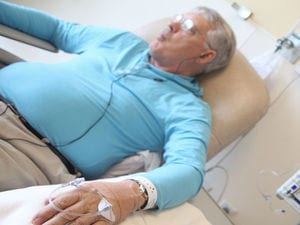
TUESDAY, Oct. 2, 2018 (HealthDay News) — Type 2 diabetes is associated with an increased risk of developing cancer and dying from certain forms of the disease, a new study suggests.
However, the researchers noted, the absolute increased risk is low.
“Our findings do not suggest that everyone who has diabetes will go on to develop cancer in later life,” said study leader Hulda Hrund Bjornsdottir, from the Swedish National Diabetes Register.
Her team analyzed data gathered between 1998 and 2014 from more than 450,000 people in Sweden with type 2 diabetes and more than 2 million people without diabetes who were followed for an average of seven years. The study focused on 12 types of cancer.
The study couldn’t prove cause-and-effect. However, compared to those without type 2 diabetes, people with the blood sugar disease had a 231 percent higher risk of liver cancer, a 119 percent higher risk of pancreatic cancer and a 78 percent higher risk of uterine cancer.
In addition, those with diabetes had an increased risk of penile cancer (56 percent higher), kidney cancer (45 percent higher), gallbladder and bile duct cancer (32 percent higher), and stomach cancer (21 percent higher). They also had a 20 percent higher risk of colorectal cancer and bladder cancer, and a 5 percent higher risk of breast cancer.
The research was to be presented Tuesday at the annual meeting of the European Association for the Study of Diabetes, in Berlin.
The findings don’t necessarily mean that diabetes somehow causes cancer, Bjornsdottir stressed. Instead, “diabetes and cancer share certain risk factors that might contribute to these associations, including obesity, smoking and diet,” she explained in a meeting news release.
When the investigators looked at the results over a 10-year period, they found there was a 38 percent greater increase in new cases of pancreatic cancer and a 30 percent greater increase in lung cancer incidence among people with type 2 diabetes than among those without the blood sugar disease.
The researchers also found that among patients with type 2 diabetes, death rates were 29 percent higher for prostate cancer, 25 percent higher for breast cancer and 9 percent higher for colon cancer, when compared with people without diabetes.
“With the number of people with type 2 diabetes doubling over the past 30 years, our findings underscore the importance of improving diabetes care,” Bjornsdottir said.
Now, with diabetes tied to cancer risk, “the importance of a healthy lifestyle is clearer than ever,” she added.
More than 415 million people worldwide have diabetes — about one in 11 adults — and the number is expected to rise to 642 million by 2040, the study authors noted.
Research presented at medical meetings should be considered preliminary until published in a peer-reviewed journal.
More information
The American Academy of Family Physicians has more on diabetes.
